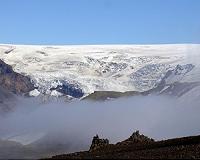| . |  |
. |
Leipzig, Germany (AFP) May 27, 2010 Europeans are trying to learn from transport chaos caused last month by the eruption of an Icelandic volcano, but a deeper understanding of the event and tighter coordination will take time, and the threat has not disappeared. Air traffic disruption appears inevitable should an ash cloud reappear in European airspace but "it would be a similar but better situation" than in April, said Bo Redeborn, a director of Eurocontrol, the European organisation charged with air traffic safety. He and other experts met from Wednesday to Friday at the International Transport Forum in Leipzig, eastern Germany. A report by experts from the University College of London warned meanwhile that although the Eyjafjoell volcano has calmed down, an eruption of its neighbour Katla, which is bigger and more powerful, was a strong possibility. During Eyjafjoell's highest activity peak in the week after it began erupting, it caused the biggest aerial shutdown in Europe since World War II, affecting more than 100,000 flights and eight million passengers. In late April, European countries drafted a temporary classification that established a red zone where ash density prevented flights, a gray zone where the risk was acceptable and a clear zone. "In April all was in the red" amid doubt over just how serious a risk the ash cloud represented, Redeborn said. Flights are currently to be grounded when ash density reaches two milligrammes per cubic metre of air, explained Bernadett Weinzierl, a physicist at the German Aerospace Centre. That is a temporary industrial benchmark based on previous incidents however and could be revised in the future. "There are still several question marks about volcanic ash and its effect on air safety," said Weinzierl, who took part in a test flight over Iceland in April to observe the event. "The risk might vary based on the kind of engines for example," she noted. "When the information on the volcano ash will be sufficient, we will be able to redesign the models and the procedures," added Eric Kroes, an expert at the Dutch transport ministry. A new method to evaluate risk management and decide whether to shut down air traffic will be submitted for approval by the International Civil Aviation Organisation (ICAO) in September. By then, countries should have standardised their measures and limits for volcanic ash, German Transport Minister Peter Ramsauer said thursday in Leipzig. The European Commission has estimated airline and travel agency losses from the grounding of air traffic in April at up to 2.5 billion euros (three billion dollars). Several carriers have suggested governments should provide compensation and have called for the integration of Europe's air space to be speeded up. The elimination of a patchwork of national airspaces is aimed at meeting future needs in terms of capacity and air security. "In air transportation, the establishment of a single centre of decision at the European level is still far off, because each administration is trying to preserve national echelons, the ones they control best," said Yves Crozet, professor of transport economy in Lyon, central France. A single European air space is to be created sometime between 2016-2020, said Redeborn of Eurocontrol. "Eurocontrol needs a mandate to take certains decisions on behalf of members states," he said.
Share This Article With Planet Earth
Related Links Bringing Order To A World Of Disasters When the Earth Quakes A world of storm and tempest
 Second Iceland volcano could erupt in near future: experts
Second Iceland volcano could erupt in near future: expertsLondon (AFP) May 27, 2010 An Icelandic volcano neighbouring Eyjafjoell, whose eruptions paralysed Europe's skies last month, could come to life in the near future, experts warned Thursday. "An eruption in the short term is a strong possibility," experts said, referring to Katla, which is larger and fiercer than Eyjafjoell, in a report from the University College London (UCL) institute for risk and disaster reduction ... read more |
|
| The content herein, unless otherwise known to be public domain, are Copyright 1995-2010 - SpaceDaily. AFP and UPI Wire Stories are copyright Agence France-Presse and United Press International. ESA Portal Reports are copyright European Space Agency. All NASA sourced material is public domain. Additional copyrights may apply in whole or part to other bona fide parties. Advertising does not imply endorsement,agreement or approval of any opinions, statements or information provided by SpaceDaily on any Web page published or hosted by SpaceDaily. Privacy Statement |